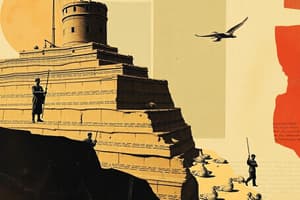Podcast
Questions and Answers
What is cultural history?
What is cultural history?
Cultural history studies the social, cultural, and intellectual developments of societies and how culture influences historical events.
Name two key aspects of cultural history.
Name two key aspects of cultural history.
Art and literature, and religion and beliefs.
What methodology is commonly used in cultural history?
What methodology is commonly used in cultural history?
An interdisciplinary approach that incorporates methods from anthropology, sociology, and literary studies.
How does cultural exchange influence societies?
How does cultural exchange influence societies?
Discuss the impact of the Renaissance on European culture.
Discuss the impact of the Renaissance on European culture.
What does the term 'nationalism' refer to in cultural history?
What does the term 'nationalism' refer to in cultural history?
Who is Johann Gottfried Herder and why is he significant?
Who is Johann Gottfried Herder and why is he significant?
What issues surround cultural appropriation today?
What issues surround cultural appropriation today?
What is the role of digital culture in contemporary times?
What is the role of digital culture in contemporary times?
What theme involves the transformation of cultural practices due to globalization?
What theme involves the transformation of cultural practices due to globalization?
Flashcards are hidden until you start studying
Study Notes
Cultural History
-
Definition:
- Cultural history studies the social, cultural, and intellectual developments of societies, examining how culture influences and is influenced by historical events.
-
Key Aspects:
- Art and Literature: Exploration of artistic movements, literature, and their societal impacts.
- Religion and Beliefs: Analysis of how religious practices shape cultures and societal norms.
- Daily Life: Understanding the everyday experiences and customs of people within historical contexts.
- Gender and Identity: Examination of roles, representations, and the evolution of gender identity through history.
-
Methodologies:
- Interdisciplinary Approach: Incorporates methods from anthropology, sociology, and literary studies.
- Primary Sources: Utilizes texts, artifacts, and oral histories to construct narratives.
- Comparative Studies: Often compares different cultures or historical periods to understand cultural dynamics.
-
Key Themes:
- Cultural Exchange: Impact of trade, migration, and conquest on cultural interactions and changes.
- Nationalism and Identity: How cultures create and reinforce national identities through symbols, myths, and narratives.
- Modernity and Change: The transformation of cultural practices in response to technological advancements and globalization.
-
Important Events and Movements:
- Renaissance: Rebirth of arts and sciences, influencing European culture profoundly.
- Enlightenment: Emphasis on reason and individualism, affecting political and cultural thought.
- Colonialism: Cultural imposition and syncretism resulting from colonial encounters.
-
Notable Figures:
- Johann Gottfried Herder: Advocate for understanding culture through its unique historical context.
- Michel Foucault: Examined the relationship between power, knowledge, and cultural practices.
-
Contemporary Issues:
- Cultural Heritage: Preservation of cultural identities in an increasingly globalized world.
- Cultural Appropriation: Debates over the borrowing of cultural elements and its implications.
- Digital Culture: Impact of the internet and social media on cultural dissemination and interaction.
Cultural History Overview
- Focuses on social, cultural, and intellectual developments within societies and how they interact with historical events.
Key Aspects of Cultural History
- Art and Literature: Investigates artistic movements and literary works, analyzing their influence on society and culture.
- Religion and Beliefs: Studies the impact of religious practices on cultural norms and societal structures.
- Daily Life: Explores the customs and everyday experiences of people in various historical contexts.
- Gender and Identity: Looks at the evolution of gender roles and identity representation throughout history.
Methodologies in Cultural History
- Interdisciplinary Approach: Merges techniques from anthropology, sociology, and literary studies for a comprehensive understanding.
- Primary Sources: Employs texts, artifacts, and oral histories to create historical narratives.
- Comparative Studies: Analyzes and contrasts different cultures or historical periods to grasp cultural dynamics.
Key Themes in Cultural History
- Cultural Exchange: Examines how trade, migration, and conquest lead to cultural interactions and transformations.
- Nationalism and Identity: Investigates how national identities are formed and reinforced through cultural symbols and narratives.
- Modernity and Change: Studies changes in cultural practices due to technological advancements and globalization.
Important Events and Movements
- Renaissance: Marked a significant revival of arts and sciences, profoundly shaping European culture.
- Enlightenment: Emphasized reason and individualism, significantly influencing political and cultural ideologies.
- Colonialism: Explores the cultural impositions and syncretism that result from colonial encounters and dominance.
Notable Figures in Cultural History
- Johann Gottfried Herder: Promoted the idea that culture must be understood within its unique historical framework.
- Michel Foucault: Investigated the interconnectedness of power, knowledge, and cultural practices.
Contemporary Issues in Cultural History
- Cultural Heritage: Focuses on the preservation of cultural identities amid increasing globalization.
- Cultural Appropriation: Discusses controversies surrounding the borrowing of cultural elements and its ethical implications.
- Digital Culture: Analyzes the effects of the internet and social media on the spread and interaction of cultural elements.
Studying That Suits You
Use AI to generate personalized quizzes and flashcards to suit your learning preferences.




